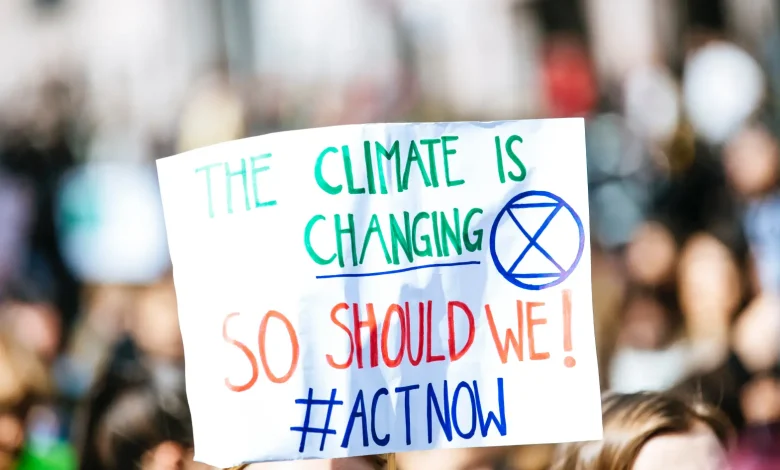Effects Of Climate Change on the Our Future

We have been hearing the term climate crisis frequently lately. Especially this year, there are many conferences, symposiums and meetings on the climate crisis, because the climate crisis is a problem that will affect all countries of the world. The climate crisis, like the Corona virus, is a global problem so countries need to deal with this problem jointly. Although countries try to maximize their power among each other, in an environment of climate crisis, maximizing power actually does not matter. Even if countries are statico, powerful and wealthy, the climate crisis precedes these adjectives. If countries ignore this crisis, the world is in danger of extinction. It should not be forgotten that the climate crisis will not only affect people, but will affect the lives of all living things on earth. As a result, there are also problems caused by the deteriorated ecological balance. The climate crisis is a direct precursor to the food crisis. The deteriorating climate will also affect agricultural products. Although it is impossible to completely prevent the climate crisis due to the increase in the human population day by day, it should be the duty of the countries to make policies to reduce the effects of this crisis. In this essay, I will examine about the factors that cause the climate crisis and the damage these factors will cause to our future and examine how countries will decelerate the climate crisis.
First of all, in this section, I will examine the factors that cause the climate crisis. The Intergovernmental Panel on Climate Change states that the main cause of global climate change is the increase in greenhouse gas emissions as a result of human activities. The burning of fossil fuels such as life, oil and natural gas is the most important factor in increasing the carbon dioxide ratio in the atmosphere. According to the IPCC, more than half of anthropogenic greenhouse gas emissions belonged to carbon dioxide in fossil fuel use. Also, especially with the increasing globalization, the damage done by transnational companies to nature by only caring about their profits is high. These companies, which only aim to make a profit, frequently use fossil fuels such as coal, natural gas, oil, and therefore they release gas into the atmosphere. As a result of these gases causing the greenhouse effect, we are faced with this problem, known as climate change, which threatens the life of all living things on earth. The fact that the average temperature is higher than the previous years has led to the emergence of global warming. This temperature change has effects such as the change in weather events, the change of seasons, the increase in sea water due to the melting of glaciers.
Government of an agreement of the results was decided to be the average temperature of less than about 2 degrees. If there is a temperature increase of more than 2 degrees, it is expected that diseases, the death of some living things, natural disasters will increase and the number of people leaving their living areas will increase. It is emphasized that this temperature increase, which was agreed by the governments, is due to the pressures especially from domestic and international companies. These changes in climate greatly affect people’s living spaces and agricultural activities. This is exactly a crisis. It is clear that increasing industrial establishments and supranational companies are the biggest causes of global warming and climate change, which affect the life cycles of humans and all other living beings. The desire for unlimited growth has reached the level that will destroy humanity. It should not be forgotten that even if such a large amount of consumption of natural resources in the world contributes to economic growth, it will be to the detriment of people in the long run. While experts see the economic growth of states and companies as a fact of the realist tradition, they argue that protecting the natural ecosystem is at least as important as this fact. Because all possible environmental disasters are far beyond the capital accumulation gained. The biggest reason why we have come to this situation is that the economists of the past period ignored important vital factors other than capital increase and economic growth. In summary, the increasing use of fossil fuels due to industrialization is seen as the main cause of the climate crisis. Most countries in our world support the free market. It even supports many companies. But they do not care about the damage they do to nature. In such a capitalist system, an increase in energy consumption is inevitable. Trying to keep the economic growth above a certain balance depending on the population increases the need for natural resources. This allows us to have natural resources that are disappearing day by day as economies grow. In short, even if the use of natural resources increases production, it destroys the ecological balance and causes various ecological problems by disrupting the balance of the carbon cycle. Waste gases sent to the sky, namely CO2, increase the amount of carbon gas in our atmosphere. As a result, excess carbon dioxide accumulating in the atmosphere causes environmental problems by warming the earth. GDP is one of the most important economic data for countries. While countries aim to increase their GDP, they use the resources in our world as they want. It is inevitable for countries to care about the damage they cause to the environment as much as they care about their GDP. Capitalism has difficulties in controlling the climate change caused by overconsumption. No one should object that people and natural resources are being exploited because of their growth ambitions. This excessive sense of ambition causes an increase in the number of environmental and social problems. Greenhouse gases, which have been increasing rapidly since the industrial revolution, have affected the relationship between human and environment.
In the second part of my essay, I will examine how the climate crisis will affect our future. As I mentioned in the first chapter, the climate crisis causes many diseases, animal deaths, and various food crises. The main reason for these factors is the health problems caused by the climate crisis. The food crisis that will occur due to the climate crisis will lead to malnutrition of people and a decrease in their immune systems. This weakened immune system will cause many diseases. While it will be very easy to fight these diseases in an environment where there is no climate crisis, even the most ineffective disease will cause the death of thousands, maybe millions of people. In addition, it is certain that there will be blood pressure patients and babies who cannot withstand the rising temperatures and die.
The injustices exacerbated by the climate crisis and its attendant environmental repercussions have serious public health implications, particularly for the poor, the elderly, children, racial and ethnic minorities, and other vulnerable populations. Furthermore, the climate catastrophe has the potential to worsen migration and gender-based health inequities. (Plos Med, 2018)
The increase in temperature will also change the structure of the waters on the earth and cause various diseases. As the countries of the world, we may have to give more of our fight against the COVID 19 epidemic to other infectious diseases, and it will be more difficult to prevent other infectious diseases that will occur. I mentioned that the biggest factor in the deterioration of our health in the climate crisis is the food crisis. Now I want to talk about the impact of the climate crisis on food. The climate crisis reduces product efficiency and triggers people’s inability to reach food. All the seeds planted by the farmers have a climate in which they can live. Changing climatic conditions will cause problems in crops. In addition, the increase in temperature rates will leave many regions in danger of drought. As a result of the increase in the need for water in arid regions, it also paves the way for a possible water crisis. Even if we witness a food crisis in some regions today, I would like to emphasize that the climate crisis and the climate crisis we will experience in the future will be more effective in today’s climate crisis and will leave people helpless. It is an indisputable fact that the farmers’ inability to gain productivity in the crops they plant and the decrease in product diversity have an indisputable effect on human health. Another important area affected by drought is animal husbandry. Drought and sudden change in temperature will cause a decrease in the water the animals eat and the water they drink. All these crises will cause price increases in products and will also cause an economic crisis. But it should not be forgotten that in such an environment, the biggest problem of people will be their health, so a possible economic crisis will remain behind all these crises. Every person has a responsibility to mitigate the impact of the climate crisis. At this stage, reducing the use of fossil fuels is seen as one of the most important building blocks of this process. If we want to get rid of the climate crisis, we need to minimize our use of fossil fuels in order to reduce the effect of greenhouse gases. It is imperative that we make a mental revolution in our consumer-dependent society. Encouraging people to produce in traditional ways rather than consumption is one of the main policies that should be implemented by all countries. People need to replace renewable energy sources in production as soon as possible.
The countries of the world have approved the construction of electric vehicles instead of petrol-powered vehicles. If we obtain electricity from renewable energy sources, we can say that these policies will certainly allow the effect of global warming to decrease. Although these transformations will be difficult for the imperial powers, who only think about the growth of the country’s economy and do not care about environmental events, this transformation is now a necessity. Various conferences, symposiums and agreements were held to stop the climate crisis. One of the most important of these is the Paris Climate Agreement. According to the agreement, a series of measures was signed as an agreement to bring the average temperature increase to 2 degrees or even 1.5 degrees. In order to prevent the climate crisis by reducing the effect of greenhouse gases, the targets of a significant decrease in fossil fuels for the years 2030 and 2050 were determined in the Paris Climate Agreement.
If I summurize my essay, despite the fact that governments strive to enhance their power among themselves, in the face of a climatic disaster, power does not matter. Even if governments are stable, powerful, and affluent, the climatic crisis takes precedence over these characteristics. The planet is in risk of extinction if governments ignore the situation. It should not be overlooked that the climate catastrophe will touch not just humanity, but all living species on the planet. As a result of the disturbed ecological balance, there are other issues. The food crisis is a direct result of the climate issue. A changing climate will have an impact on agricultural goods. Although it is difficult to totally avert the climate catastrophe owing to the ever-increasing human population, it is the responsibility of governments to develop measures to mitigate the issue’s consequences. The Paris Climate Agreement was signed between many states, and it was aimed to reduce global warming to 2 or even 1.5 degrees in the years 2030 and 2050.



